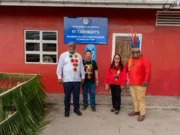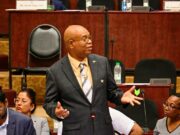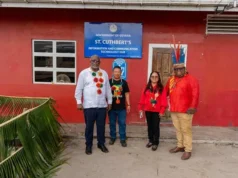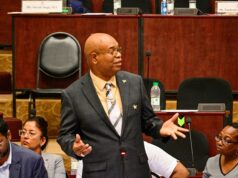Dear Editor
I do not know who Mr. Derek Singer is, or whether he is Guyanese, and if he is, whether he resides within the 83,000 square miles that has definitively made up Guyana’s land territory since the 1899 Arbitral Award that settled the borders between British Guiana and Venezuela and the 1905 Agreement that formalised that Award, and to which Guyana succeeded upon independence in 1966. What I do know, is that Mr. Singer’s misleadingly-titled article “Guyana Betrayed? ICJ Vote by Allies India and China Raises Alarms as Venezuela Celebrates”, published in the online Guyana Graphic of 9 May 2025 is unpatriotic and so replete with misrepresentations and untruths that it warrants a fact-based response.
I am painfully aware of how untrue publications like this, once out there on social media, can “catch fire” among an uninformed, Kool-aid drinking readership: a fabricated story peddled in 2020 by young inexperienced APNU trolls that the CARICOM Election Observer Report was drafted inside Freedom House and finalised by yours truly while I was Adviser to the CARICOM Secretary General is likely still out there in cyberspace (at the time, a decision had been taken to ignore abrasive comments like this against Secretariat staff and not get embroiled in litigation). Against this backdrop, I feel constrained to set the record straight on this matter of the utmost national importance with a true and accurate commentary on the ICJ’s Award of Provisional Measures dated 1 May 2025.
Notwithstanding the interrogatory in the title of Mr. Singer’s article, the premise that Guyana might have been “betrayed” by its allies India and China, on the basis of two explanatory votes by nationals of those countries who sit on the Court, although they had concurred in the initial unanimous decision against Venezuela, is ridiculously unfortunate and not grounded in facts. Article 2 of the Statute of the Court states that it ‘shall be composed of a body of independent judges elected regardless of their nationality from among persons of high moral character…’, while Article 20 obliges a judge to, ‘before taking up his duties, make a solemn declaration in open court that he will exercise his powers impartially and conscientiously’. So, once a judge is successful in becoming a member of the Court, any prior allegiance, loyalty or national obligation ceases as regards his work on the Court – in other words, no “betrayal” can be attributed to a country, as a result of the vote of a judge who is a national of that country.
But assuming without admitting that I am wrong – which I’m not – and Mr. Singer isn’t – but the facts will bear out that he is – should we then conclude that from 1988 to 1997, during the tenure of Guyanese Judge Mohamed Shahabuddeen on the ICJ, that every time the Honourable Judge delivered a judgment against a country that was a friend of Guyana, that country was “betrayed” by Guyana? Did H.E. Justice Patrick Robinson (my former Jamaican colleague on the Sixth (Legal) Committee of the UN) only vote for Guyana in December 2023 because he hails from a sister CARICOM nation? Now that Mr. Justice Robinson has retired from the ICJ and the Latin American and Caribbean Group at the UN is represented by judges from Mexico and Brasil, has Venezuela been “betrayed” by those two countries because of the support of these two jurists for Guyana? Has Venezuela been “betrayed” by H.E. Philippe Couvreur, the ad hoc judge that it appointed in the case, who voted in favour of the unanimous decision to ‘[R]eaffirm[s] the Provisional Measures… of 1 December 2023….?’
In a feat of sensationalism, Mr. Singer states that ‘[T]he vote sparked widespread outrage in Georgetown….’. I happen to live in Georgetown, and the only outrage that has been widespread in Georgetown of recent – indeed, the nation as a whole – is as regards the tragic loss of life of little Adriana Younge, under painfully unclear and as yet disturbingly undetermined circumstances.
Along the same emotive lines, Mr. Singer says that the dissenting judges have ‘…shocked Guyana’s leadership and citizens alike’. If this is true, then why did President Ali, in response to the ICJ’s May 1 2025 Order, in a Facebook post the very next day, state that ‘Once again Guyana’s position has prevailed’. Unless this is a novel way to express shock, H.E. said that ‘[T]he Government of Guyana welcomes this decision’ (maybe it’s a pleasant shock). Neither have I seen nor heard any citizens expressing shock in response to any aspect of the ICJ’s Order; perhaps it was done sotto voce….
Under the sub-heading “A Stunning Reversal by Trusted Partners”, the writer states that “India’s vote against Guyana is particularly painful….’. He draws this conclusion by juxtaposing the vote of Judge Bhandari, who hails from India, with the ‘warmth and fanfare with which Prime Minister Modi was welcomed’ last year by the Government of Guyana, and the ‘millions of dollars’ ‘reportedly spent…to host the Indian leader’.
This opinion represents a stunningly simplistic approach as regards assessing the manner in which diplomacy is conducted.
It is not often the case, if at all, that relations between two countries are so linear; it is certainly not the case, when an attempt is made to draw a connection between a decision of a national sitting as an independent judge at the ICJ, who is beholden to no Member of the UN, and the official position advanced by his country of nationality at the inter-governmental level.
The fatal flaw is to assume that a position taken at the ICJ by a judge is directly related to the national position of a country; moreover, as previously explained, Judge Bhandari, who hails from India, was part of the unanimous decision of May 1 2025 to reaffirm the first set of provisional measures of December 2023! Where then is the ‘stunning reversal by trusted partners?’
The conclusion is drawn by the writer that ‘Judge Bhandari’s vote against Guyana is widely interpreted as a betrayal of …goodwill’ that was extended last year to Prime Minister Modi. While I have just explained that the distinguished Judge did not ‘vote against Guyana’, I ask, how wide is this interpretation, and by whom? Is it widely interpreted as is claimed, by lawyers, politicians, academics, civil society, private sector, the proverbial “man in the Kitty-Campbellville minibus”…by whom, pray tell?
Turning to China, if I understand Mr. Singer correctly, his position is that in exchange for Guyana allowing China to invest huge sums here, ‘[T]he expectation of diplomatic reciprocity in matters of existential national interest was assumed’. It is really counter-intuitive that someone would believe that foreign policy positions – or indeed even life decisions in general – are formulated on the basis of assumptions! One should never assume anything, be it in diplomacy or geo-politics.
And again, regarding the vote by Judge Xue, who hails from China, Mr. Singer posits that ‘many see [it] directly undermining Guyana’s legal and territorial claims’. Just like Judge Bhandari, Judge Xue was part of the unanimous decision on reaffirming the first set of provisional measures of December 2023; how then could Judge Xue’s vote directly undermine Guyana’s position? Who are the ‘many [who] see’ the vote as such? How many are they, pray tell, where art thou!?
More, I have sought to interrogate further the stance taken by Mr. Singer as regards China. As an example, if you have invested money in say, Banks DIH or DDL, would you not want your investment to bear fruit and pay dividends and returns? Similarly, as the writer says, ‘China has invested hundreds of millions, potentially billions, of U.S. dollars in infrastructure, energy and technology contracts’, within the territorial space of Guyana. If, as is claimed, Judge Xue is answerable to Beijing, why then would they want him, by his vote, to ‘directly [undermine] Guyana’s legal and territorial claims?’ Would China not, by Judge Xue’s vote “against” Guyana, threaten all of its billion-dollar infrastructural work in Guyana, as well as the CNOC stake offshore?
Respectfully, this to me is some real jumbled-up reasoning; quite frankly, “it don’t wuk so in diplomacy!” As a matter of foreign policy, a decision by a judge at the ICJ cannot be tested for symmetry or alignment alongside billions of dollars in investment by the country of his nationality. The ebb and flow of diplomacy does not, in the normal scheme of things, extend as far as deliberations on legal questions before the ICJ that are adjudicated by judges who swore a solemn declaration of impartiality in open court.
What the writer regards as ‘[T]he dissenting votes from India and China’ are in fact the votes of two individual jurists – not the votes of these two Members of the UN – who, after partaking in the unanimous vote to reaffirm the original provisional measures of 1 December 2023, declined to add anything more to those measures. Instructively, the three dissenting judges – Germany included – agreed with the content of the second provisional measure requested by Guyana, which was specifically on the conduct of elections in territory currently administered by Guyana; however they were of the opinion that the original Order of 1 December 2023 was clear enough to address Guyana’s concerns.
So what then is the ‘legal setback and…diplomatic crisis for Guyana’ referred to by Mr. Singer, if all (15 plus 2 ad hoc) judges agreed with the reaffirmation of the original order, and 3 judges agreed also with the content of the second provisional measure on 1 May, 2025, but declined to support it because they were of the view that the first order of December 2023 was sufficient? Is that a credible basis upon which ‘[T]he government must re-evaluate its foreign policy alignment’? Respectfully, the stuff of diplomacy is much more sophisticated and complex than that.
Who is the sole, solitary, singular ‘political commentator’ that flippantly remarked that ‘[F]riendship must be measured not in parades and photo-ops, but in moments of crisis’: could it by chance be one Derek Singer!? I ask again, where is the diplomatic crisis!? How does a crisis arise from a decision of the ICJ that is welcomed by the Government of Guyana!?
According to Mr. Singer, ‘[C]alls have already begun for the government to demand formal explanations from India and China’. From whence are these calls emanating? How in the name of The Almighty can the Government of Guyana demand from a sovereign government a ‘formal explanation’ for a decision taken by a national of theirs who is independent of any control of his government? It would be unfortunate if the Guyana Foreign Ministry were to follow Mr. Singer down this rabbit hole and dispatch a Diplomatic Note to that effect to either of the resident diplomatic representatives here. If such were to be the case, it would quite likely be met either with a stony silence, or perhaps returned under cover of a Note of Reply politely enquiring whether the request for the explanation might have been sent in error!
Mr. Singer should identify who are the faceless and nameless civil society leaders who are ‘urging a review of bilateral agreements and economic commitments’. Do they hail from academia, the private sector, the religious groups? On what basis are such reviews to be undertaken? Is it because two independent judges agreed with Guyana’s two requests to the ICJ, but thought the second request was unnecessary, that this is somehow a necessary and sufficient condition for Guyana to conduct such a review? To what end? To influence the final decision of the ICJ? Diplomacy simply does not work like that!
After having assessed the erroneous views espoused in the article, I return to my initial queries about whether Mr. Singer is Guyanese and moreso whether he lives in Guyana. To show how out of touch with reality is Mr. Singer, the Leader of the Opposition Mr. Aubrey Norton at a recent Thursday press conference voiced his support for ‘the case before the International Court of Justice (ICJ), and we believe that we will have a positive outcome’. There was no mention from the Opposition Leader of ‘betrayal’, ‘diplomatic crisis’, nor calls for a ‘review of…agreements…and commitments’, as a consequence of the ICJ decision; I am beginning to wonder whether Mr. Singer inhabits the same “Fantasy Island” where it seems Mr. Maduro lately is to be found.
Instead of trying to read the diplomatic tea leaves by looking towards the decisions of judges at the ICJ, may I direct Mr. Singer to the more reliable statements of India’s officially accredited representative to this government, H.E the High Commissioner of India to Guyana, at his recent press conference. His Excellency unequivocally expressed India’s support for the on-going process to settle the border controversy at the ICJ; sorry Mr. Singer, I guess the millions spent on Mr. Modi’s visit are paying off after all, regardless of your erroneous interpretation of the decision of the Indian judge at the ICJ.
Conversely the view was expressed recently by the relatively inexperienced Charge d’Affaires of China’s Embassy, that the controversy must be settled through bilateral negotiations, notwithstanding the on-going process at the ICJ; this view is apparently in line with Venezuela’s often-stated position. This is surprising, as Guyana and China are old friends, having been the first CARICOM country to establish diplomatic relations with Beijing in 1972. This apparent faux pas must therefore be taken for what it is – unfortunate diplomatic overreach.
In this era of instant news, AI, smart phones and cybercrime, it is important for editors and news outlets to be circumspect and cautious about fact-checking sensitive pieces of writing submitted for publication, lest they be sucked into that gaping vortex of fake news and misinformation. Essequibo belongs to Guyana!
Yours respectfully,
Neville J. Bissember













